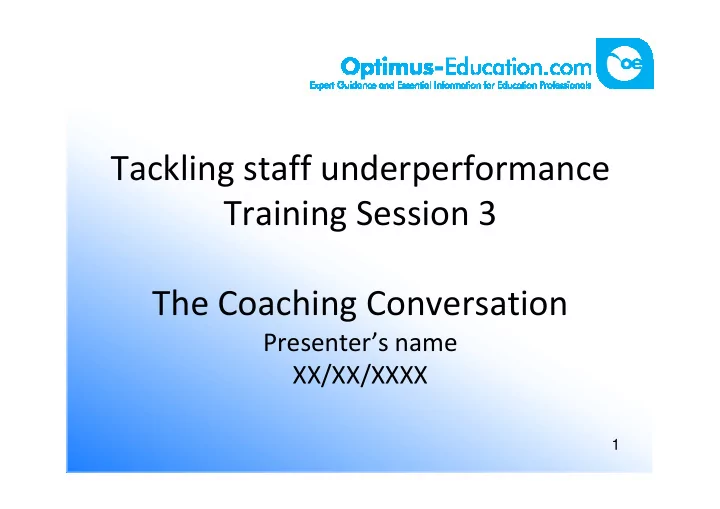

Tackling staff underperformance Training Session 3 The Coaching Conversation Presenter’s name XX/XX/XXXX 1
Choose your ‘Situational Leadership’ style Supporting: Coaching: High Relationship and High Task and Low Task High Relationship Delegating: Directing: Low Task and High Task and Low Relationship Low Relationship 2
Maslow’s hierarchy of needs Safety Needs ��������������������������������������������������� Belonging and Love Needs �������������������������������������������� Esteem Needs ����������������������������������������������� Biological and Physical Needs ���������������������������������������������� Self-actualisation ������������������������������ 3
Maslow’s hierarchy of motivation Self-actualisation ������������������������������ Esteem Needs ����������������������������������������������� Belonging and Love Needs �������������������������������������������� Safety Needs ��������������������������������������������������� Biological and Physical Needs ���������������������������������������������� 4
Esteem and ego needs How are these being met? In school: o responsibility o promotion o informal recognition or influence informal recognition or influence Out of school: o golf, sailing, sports clubs o bridge, darts, quiz clubs o local politics and community organisations o amateur dramatics 5
Self-actualisation needs In my: I feel I am o paid work • making a difference… o family • making a worthwhile o wider wider contribution… contribution… community… • living a meaningful o nowhere life… • building a legacy for the future… 6
Personal success coaching 5 6 4 7 3 8 9 2 Where would you put yourself now? Why? 10 1 What would it take to move up to the next point? What would it take to move up to the next point? Move up. How does that feel? What is different? Imagine … What point would you be on then? What did you need to do to get there? Looking back at yourself on point x (starting point), what advice would you give yourself? 7
Audio slide Click to listen to the Audio: 8
Courageous conversations ‘Effective leaders hold people to account, have high expectations of them and challenge underperformance and mediocrity not because they like power but because the children and young people deserve the best.’ young people deserve the best.’ Steve Munby (Chief Executive, National College) at the Annual Leadership Conference, 2010 9
Solution-focused counselling To listen to the mentee’s frame of reference, you must: o set aside yours o show abundant and genuine curiosity o adopt the posture of not knowing o echo and explore key words echo and explore key words o ask speculative questions: ‘If things were better with your Y9 class, what would be different?’ o regularly feed back your understanding of their thoughts and feelings o use silence and ‘what else?’ From IK Berg and P De Jong ‘Interviewing for Solutions’ www.briefconsultancy.com 10
And what else…? The phrase ‘Good. And what else?’ is immensely powerful. It encourages people to look more deeply into the possibilities. Options that they have ‘censored’ or discounted might come to the surface. Ideas that they have subconsciously hidden become clear. Options they are avoiding because they would require them to get out of their comfort zone emerge. 11
Feedback in coaching mode Agree a scenario in which you are going to discuss an area of underperformance with a colleague who is defensive and insecure, but not obdurate. but not obdurate. One to coach, one to be coached and one to observe the coach and offer feedback on which techniques were most effective. 12
Recommend
More recommend